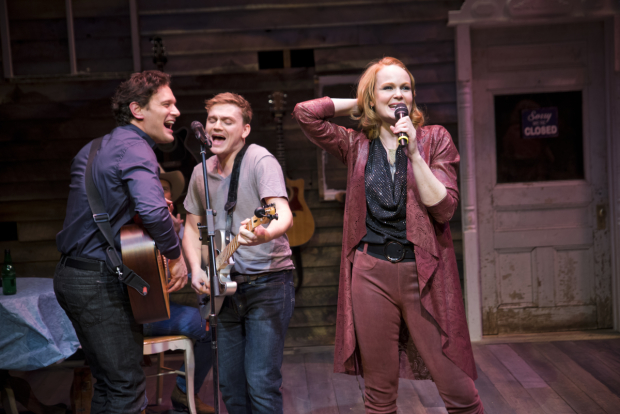
(© Jenny Anderson)
Sometimes an old story receives fresh poignancy through a change of setting: When moved to feudal Japan, Shakespeare's Macbeth became Akira Kurosawa's thrilling and vital Throne of Blood. Songbird, now making its world premiere at 59E59 Theaters, attempts to perform the same trick with Chekhov, to mixed results. Set in present-day Tennessee, it features a script by Michael Kimmel, who penned 2010's The Last Goodbye (which used the songs of Jeff Buckley to retell Shakespeare's Romeo and Juliet). This time, Kimmel has a living composer with whom to collaborate: With gorgeous original songs by Lauren Pritchard, Songbird is an attractive, albeit sleepy new musical with a distinctively American sound.
Tammy Trip (Kate Baldwin) is the biggest name in country music. At least, she used to be. Her career has been sagging lately, but she still feels like a star when she returns to her friends and family in Nashville. That's especially true at the bar and music venue owned by her brother, Soren (a believably grizzled Bob Stillman), and managed by her dear friends Samuel (Andy Taylor) and Pauline (Erin Dilly). Their daughter, Missy (the moody yet lovable Kacie Sheik), tends bar and the local doctor (Drew McVety) is a frequent patron. Tammy hasn't set foot in this place in years, but she has come home to introduce an innovative new song by her son, Dean (Adam Cochran). Instead, mom embarrasses him by talking through his duet with the beautiful young chanteuse Mia (Ephie Aardema). Making matters worse, Mia is obsessed with Beck (the handsome Eric William Morris), a successful songwriter and Tammy's boyfriend. Dean has to face the prospect of a world in which even his own mom ignores him for a less talented hack.
Fans of classic drama will instantly recognize this as the plot to Chekhov's The Seagull transplanted to present-day Nashville. Tammy is Arkadina, Beck is Trigorin, and Soren is…Soren. Considering country's preoccupation with heartbreak, it offers an ideal musical setting for the morose Russian playwright's story, even if the dramatic circumstances don't always translate.
Truly, Pritchard's songs are radio-ready. Every number is a hit, with "Cry Me a River" (movingly interpreted by Sheik, with McVety on the fiddle) leaving a particularly strong impression. Several members of the cast play instruments, and everyone sings like an angel. With powerhouse vocals and a commanding presence, Baldwin is 100 percent believable as a country superstar. Pale and brooding, Cochran brings an alt-country angst to the role of Dean that serves to illuminate the original character on which he was based. We can tell he's an outsider simply by listening to the tone of his voice.
While the musical performances are spot-on, Michael Kimmel's book scenes make a twee first impression that eventually fades to maudlin. "Open your damn eyes, pecker head," Soren yells on his entrance line after being nearly run over by a truck. He then orders a whiskey and complains about a dog. We expect such country music chestnuts in the songs, but the book could have offered a swig of something different to deepen the play's themes. Unfortunately, director J.V. Mercanti is never able to push beyond the theme park artifice of the script, leading to our somewhat shallow connection to the story and characters (although you will leave the theater with a strong desire to buy a bucket of wings).
Similarly, Jason Sherwood's set feels like the porch of a particularly boozy Cracker Barrel. Siding strategically hangs loose, while empty bottles of liquor line the ledges above the stage. It gives an immediate sense of place while verging on cliché. Mark Koss' costumes are more subtle in exacerbating the divide between Tammy and her kin: The Tennesseans mostly wear off-the-rack Walmart, contrasting highly with Tammy's Shania realness. Considering this show's many flaws, that don't impress me much.
The entire premise that Tammy is returning to provincial Nashville from cosmopolitan Los Angeles (Songbird's answer to Moscow) is somewhat undermined by the fact that Nashville caters to a significantly hipper crowd than L.A. (In 2011, Rolling Stone dubbed the country music capital "America's Best Music Scene.") Today's Nashvillians would be more likely to treat Tammy like a washed-up fossil (something Chekhov strongly suggested about her Russian counterpart). With the exception of her own son, however, the denizens of this imaginary Nashville never question her status as a demigoddess. An acknowledgement of the exciting new Nashville blooming around Soren's creaky old bar might have added new layers to the play.
Still, it manages to hold together decently until the second act, which drags unnecessarily. We can see the end on the horizon, but it just can't seem to make it there. This becomes especially tedious after Songbird blasts past the two-hour running time noted in the program. As the show makes its long slog to the finish line, you're likely to only hear Tchaikovsky's "Marche Slave," no matter how lovely Pritchard's music is.







![0928 Cleveland MatteoLane 2024 1200x1200[98] copy](https://www.theatermania.com/wp-content/uploads/sites/4/2024/10/0928_Cleveland_MatteoLane_2024_1200x120098-copy.jpeg?w=300)



